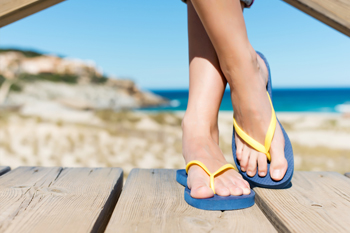
Flip-flops are a popular choice for casual footwear, especially as the weather warms up. However, their impact on foot health is a subject of ongoing debate. Typically, flip-flops offer minimal support to the arches of the feet, which can lead to problems such as plantar fasciitis or other forms of foot pain. The design of flip-flops forces the toes to grip the soles in order to keep the footwear in place while walking. This unnatural holding action can alter the way one walks, potentially causing long-term changes in foot structure and gait. The lack of cushioning and support also means that the feet are more vulnerable to injuries from stepping on sharp objects or from the stress of walking on hard surfaces. If you enjoy wearing flip-flops and are experiencing foot discomfort or changes in your walking pattern, it is suggested that you consult a podiatrist to determine the best footwear for your needs.
Flip-flops can cause a lot of problems for your feet. If you have any concerns about your feet or ankles, contact one of our podiatrists from The Podiatry Center, PC. Our doctors will assist you with all of your foot and ankle needs.
Flip-Flops and Feet
Flip-flops have managed to become a summer essential for a lot of people. While the shoes may be stylish and easy to slip on and off, they can be dangerous to those who wear them too often. These shoes might protect you from fungal infections such as athlete’s foot, but they can also give you foot pain and sprained ankles if you trip while wearing them.
When Are They Okay to Wear?
Flip-flops should only be worn for very short periods of time. They can help protect your feet in places that are crawling with fungi, such as gym locker rooms. Athlete’s foot and plantar warts are two common fungi that flip-flops may help protect your feet against.
Why Are They Bad for My Feet?
These shoes do not offer any arch support, so they are not ideal for everyday use. They also do not provide shock absorption or heel cushioning which can be problematic for your feet. Additionally, you may suffer from glass cuts, puncture wounds, and stubbed toes since they offer little protection for your feet.
More Reasons Why They Are Bad for Your Feet
- They Slow You Down
- May Cause Blisters and Calluses
- Expose Your Feet to Bacteria
If you have any questions, please feel free to contact our office located in Millburn, NJ . We offer the newest diagnostic and treatment technologies for all your foot care needs.
